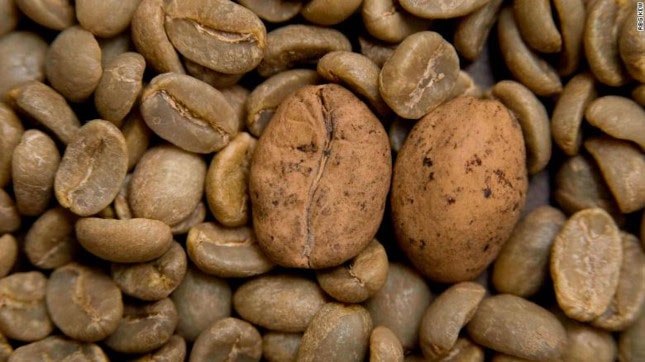Coffee trees are facing extinction in the wild.
Enjoy your daily cup of coffee while you still can, because new research shows that 60% of coffee species found in the wild could soon become extinct.
Researchers at the Royal Botanic Gardens, Kew, in the UK, warn that climate change, deforestation, drought and plant viruses are putting the future of coffee at risk.
“It’s important to remember that coffee requires forest habitats to survive,” said senior researcher Aaron P. Davis. “With so much deforestation happening around the world, wild coffee bean species are being impacted at an alarming rate.”
Mr Davis added that coffee plants grow in very specific natural environments, so rising temperatures and increased rainfall caused by climate change could make it impossible for coffee to grow in places where the plants thrive.
 |
| Of the 124 wild coffee species, 75 are endangered. |
“Given the threats from human encroachment and deforestation, some (coffee beans) could become extinct in 10 to 20 years, especially with the effects of climate change,” Dr. Davis said.
The study, published in Science Advances – a collaboration between scientists in the UK and Ethiopia – says that unless governments and commercial producers step up protections for coffee species and stockpile more seeds, people's morning coffee habits could suffer and the quality of coffee could decline significantly.
Of the 124 wild coffee species, 75 are endangered. About 35 of the 124 species grow in non-protected areas.
The most common commercially produced coffee, arabica, is already on the endangered species list. Previous research by Dr Davis has revealed that arabica could become extinct in just 60 years.
But even less common coffees are important, researchers say. Preserving diverse wild coffee plants is essential for developing commercial coffees that are resistant to climate change and pests. To create genetically modified plants, researchers need to preserve diverse coffee genes.
Scientists at Kew say that keeping coffee beans alive in banks is more difficult and expensive than other plants, so focusing on protecting the coffee’s natural environment is key.
Mr Davis has recently created three areas to protect wild Arabica coffee. However, research shows that coffee growing operations in Madagascar and Tanzania are under threat.
“The first thing you need to do is conserve them in the wild, so we need to improve the management of protected areas,” Mr Davis said. “And we also need to designate new protected areas.”
